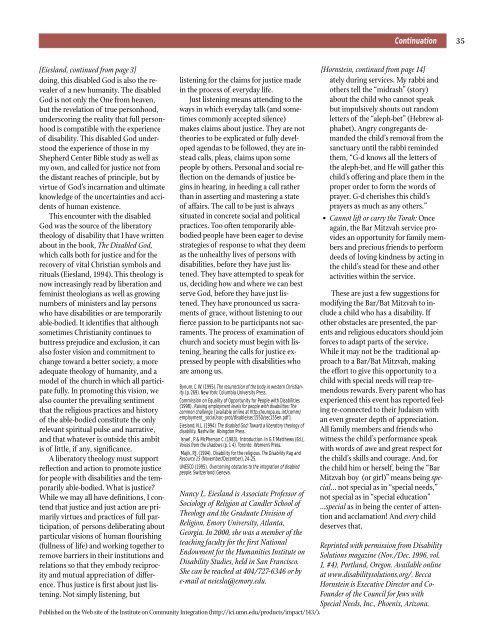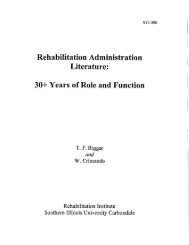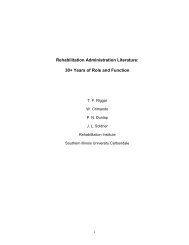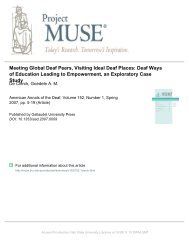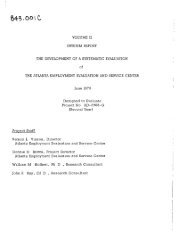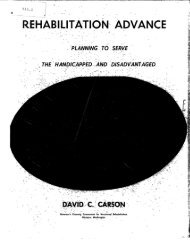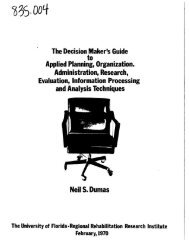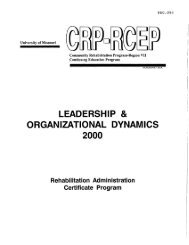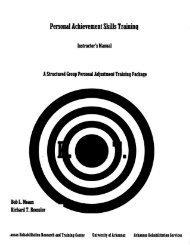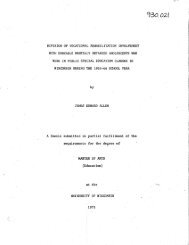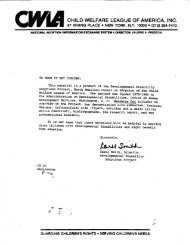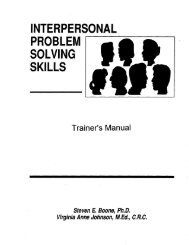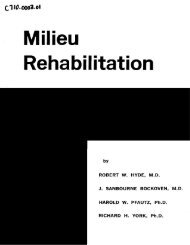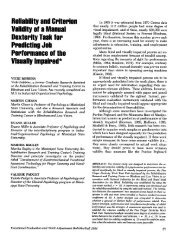Feature Issue on Faith Communities and Persons with ... - NCRTM
Feature Issue on Faith Communities and Persons with ... - NCRTM
Feature Issue on Faith Communities and Persons with ... - NCRTM
You also want an ePaper? Increase the reach of your titles
YUMPU automatically turns print PDFs into web optimized ePapers that Google loves.
C<strong>on</strong>tinuati<strong>on</strong><br />
35<br />
[Eiesl<strong>and</strong>, c<strong>on</strong>tinued from page 3]<br />
doing, this disabled God is also the revealer<br />
of a new humanity. The disabled<br />
God is not <strong>on</strong>ly the One from heaven,<br />
but the revelati<strong>on</strong> of true pers<strong>on</strong>hood,<br />
underscoring the reality that full pers<strong>on</strong>hood<br />
is compatible <strong>with</strong> the experience<br />
of disability. This disabled God understood<br />
the experience of those in my<br />
Shepherd Center Bible study as well as<br />
my own, <strong>and</strong> called for justice not from<br />
the distant reaches of principle, but by<br />
virtue of God’s incarnati<strong>on</strong> <strong>and</strong> ultimate<br />
knowledge of the uncertainties <strong>and</strong> accidents<br />
of human existence.<br />
This encounter <strong>with</strong> the disabled<br />
God was the source of the liberatory<br />
theology of disability that I have written<br />
about in the book, The Disabled God,<br />
which calls both for justice <strong>and</strong> for the<br />
recovery of vital Christian symbols <strong>and</strong><br />
rituals (Eiesl<strong>and</strong>, 1994). This theology is<br />
now increasingly read by liberati<strong>on</strong> <strong>and</strong><br />
feminist theologians as well as growing<br />
numbers of ministers <strong>and</strong> lay pers<strong>on</strong>s<br />
who have disabilities or are temporarily<br />
able-bodied. It identifies that although<br />
sometimes Christianity c<strong>on</strong>tinues to<br />
buttress prejudice <strong>and</strong> exclusi<strong>on</strong>, it can<br />
also foster visi<strong>on</strong> <strong>and</strong> commitment to<br />
change toward a better society, a more<br />
adequate theology of humanity, <strong>and</strong> a<br />
model of the church in which all participate<br />
fully. In promoting this visi<strong>on</strong>, we<br />
also counter the prevailing sentiment<br />
that the religious practices <strong>and</strong> history<br />
of the able-bodied c<strong>on</strong>stitute the <strong>on</strong>ly<br />
relevant spiritual pulse <strong>and</strong> narrative,<br />
<strong>and</strong> that whatever is outside this ambit<br />
is of little, if any, significance.<br />
A liberatory theology must support<br />
reflecti<strong>on</strong> <strong>and</strong> acti<strong>on</strong> to promote justice<br />
for people <strong>with</strong> disabilities <strong>and</strong> the temporarily<br />
able-bodied. What is justice?<br />
While we may all have definiti<strong>on</strong>s, I c<strong>on</strong>tend<br />
that justice <strong>and</strong> just acti<strong>on</strong> are primarily<br />
virtues <strong>and</strong> practices of full participati<strong>on</strong>,<br />
of pers<strong>on</strong>s deliberating about<br />
particular visi<strong>on</strong>s of human flourishing<br />
(fullness of life) <strong>and</strong> working together to<br />
remove barriers in their instituti<strong>on</strong>s <strong>and</strong><br />
relati<strong>on</strong>s so that they embody reciprocity<br />
<strong>and</strong> mutual appreciati<strong>on</strong> of difference.<br />
Thus justice is first about just listening.<br />
Not simply listening, but<br />
listening for the claims for justice made<br />
in the process of everyday life.<br />
Just listening means attending to the<br />
ways in which everyday talk (<strong>and</strong> sometimes<br />
comm<strong>on</strong>ly accepted silence)<br />
makes claims about justice. They are not<br />
theories to be explicated or fully developed<br />
agendas to be followed, they are instead<br />
calls, pleas, claims up<strong>on</strong> some<br />
people by others. Pers<strong>on</strong>al <strong>and</strong> social reflecti<strong>on</strong><br />
<strong>on</strong> the dem<strong>and</strong>s of justice begins<br />
in hearing, in heeding a call rather<br />
than in asserting <strong>and</strong> mastering a state<br />
of affairs. The call to be just is always<br />
situated in c<strong>on</strong>crete social <strong>and</strong> political<br />
practices. Too often temporarily ablebodied<br />
people have been eager to devise<br />
strategies of resp<strong>on</strong>se to what they deem<br />
as the unhealthy lives of pers<strong>on</strong>s <strong>with</strong><br />
disabilities, before they have just listened.<br />
They have attempted to speak for<br />
us, deciding how <strong>and</strong> where we can best<br />
serve God, before they have just listened.<br />
They have pr<strong>on</strong>ounced us sacraments<br />
of grace, <strong>with</strong>out listening to our<br />
fierce passi<strong>on</strong> to be participants not sacraments.<br />
The process of examinati<strong>on</strong> of<br />
church <strong>and</strong> society must begin <strong>with</strong> listening,<br />
hearing the calls for justice expressed<br />
by people <strong>with</strong> disabilities who<br />
are am<strong>on</strong>g us.<br />
Bynum, C. W. (1995). The resurrecti<strong>on</strong> of the body in western Christianity<br />
(p. 269). New York: Columbia University Press.<br />
Commissi<strong>on</strong> <strong>on</strong> Equality of Opportunity for People <strong>with</strong> Disabilities<br />
(1998). Raising employment levels for people <strong>with</strong> disabilities: The<br />
comm<strong>on</strong> challenge. [available <strong>on</strong>line at http://europa.eu.int/comm/<br />
employment_social/soc-prot/disable/sec1550/sec155en.pdf ].<br />
Eiesl<strong>and</strong>, N.L. (1994). The disabled God: Toward a liberatory theology of<br />
disability. Nashville: Abingd<strong>on</strong> Press.<br />
Israel , P. & McPhers<strong>on</strong> C. (1983). Introducti<strong>on</strong>. In G.F. Matthews (Ed.),<br />
Voices from the shadows (p. 1 4). Tor<strong>on</strong>to: Women’s Press.<br />
Majik, P.J. (1994). Disability for the religious. The Disability Rag <strong>and</strong><br />
Resource 15 (November/December), 24-25.<br />
UNESCO (1995). Overcoming obstacles to the integrati<strong>on</strong> of disabled<br />
people. Switzerl<strong>and</strong>: Geneva.<br />
Nancy L. Eiesl<strong>and</strong> is Associate Professor of<br />
Sociology of Religi<strong>on</strong> at C<strong>and</strong>ler School of<br />
Theology <strong>and</strong> the Graduate Divisi<strong>on</strong> of<br />
Religi<strong>on</strong>, Emory University, Atlanta,<br />
Georgia. In 2000, she was a member of the<br />
teaching faculty for the first Nati<strong>on</strong>al<br />
Endowment for the Humanities Institute <strong>on</strong><br />
Disability Studies, held in San Francisco.<br />
She can be reached at 404/727-6346 or by<br />
e-mail at neiesla@emory.edu.<br />
[Hornstein, c<strong>on</strong>tinued from page 14]<br />
ately during services. My rabbi <strong>and</strong><br />
others tell the “midrash” (story)<br />
about the child who cannot speak<br />
but impulsively shouts out r<strong>and</strong>om<br />
letters of the “aleph-bet” (Hebrew alphabet).<br />
Angry c<strong>on</strong>gregants dem<strong>and</strong>ed<br />
the child’s removal from the<br />
sanctuary until the rabbi reminded<br />
them, “G-d knows all the letters of<br />
the aleph-bet, <strong>and</strong> He will gather this<br />
child’s offering <strong>and</strong> place them in the<br />
proper order to form the words of<br />
prayer. G-d cherishes this child’s<br />
prayers as much as any others.”<br />
• Cannot lift or carry the Torah: Once<br />
again, the Bar Mitzvah service provides<br />
an opportunity for family members<br />
<strong>and</strong> precious friends to perform<br />
deeds of loving kindness by acting in<br />
the child’s stead for these <strong>and</strong> other<br />
activities <strong>with</strong>in the service.<br />
These are just a few suggesti<strong>on</strong>s for<br />
modifying the Bar/Bat Mitzvah to include<br />
a child who has a disability. If<br />
other obstacles are presented, the parents<br />
<strong>and</strong> religious educators should join<br />
forces to adapt parts of the service.<br />
While it may not be the traditi<strong>on</strong>al approach<br />
to a Bar/Bat Mitzvah, making<br />
the effort to give this opportunity to a<br />
child <strong>with</strong> special needs will reap tremendous<br />
rewards. Every parent who has<br />
experienced this event has reported feeling<br />
re-c<strong>on</strong>nected to their Judaism <strong>with</strong><br />
an even greater depth of appreciati<strong>on</strong>.<br />
All family members <strong>and</strong> friends who<br />
witness the child’s performance speak<br />
<strong>with</strong> words of awe <strong>and</strong> great respect for<br />
the child’s skills <strong>and</strong> courage. And, for<br />
the child him or herself, being the “Bar<br />
Mitzvah boy (or girl)” means being special...<br />
not special as in “special needs,”<br />
not special as in “special educati<strong>on</strong>”<br />
...special as in being the center of attenti<strong>on</strong><br />
<strong>and</strong> acclamati<strong>on</strong>! And every child<br />
deserves that.<br />
Reprinted <strong>with</strong> permissi<strong>on</strong> from Disability<br />
Soluti<strong>on</strong>s magazine (Nov./Dec. 1996, vol.<br />
1, #4), Portl<strong>and</strong>, Oreg<strong>on</strong>. Available <strong>on</strong>line<br />
at www.disabilitysoluti<strong>on</strong>s.org/. Becca<br />
Hornstein is Executive Director <strong>and</strong> Co-<br />
Founder of the Council for Jews <strong>with</strong><br />
Special Needs, Inc., Phoenix, Ariz<strong>on</strong>a.<br />
Published <strong>on</strong> the Web site of the Institute <strong>on</strong> Community Integrati<strong>on</strong> (http://ici.umn.edu/products/impact/143/).


